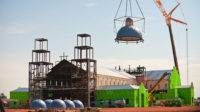


Southland Industries of Garden Grove, Calif., has evolved since the late 1940s into one of this country's largest, most innovative mechanical contractors, and a big part of its strategy is making sure new ideas and processes are based on common sense. The company helped pioneer design-build delivery and was an early champion of sustainable strategies such as lean construction and integrated project delivery. It has also pushed the boundaries of building information modeling. "We've always been a little bit different from the typical contractor," says Southland CEO Ted Lynch, who holds a Ph.D. in architectural engineering from Penn State.
"Southland is known as an innovative company across the board in engineering and construction techniques," says Mike McLaughlin, Southland's vice president of preconstruction and a leader of the company's next-generation BIM strategy development. "But it's innovation with practical applications. It's easy to dream big dreams, to come up with new systems or solutions, but the practical aspect and concern for cost are key factors as well."
Southland, for example, recognizes that BIM is more than just 3D coordination and uses it throughout a project—from design to maintenance and decommissioning. "We see the advantage of BIM for its real intent, which is full life cycle," McLaughlin says.
Lean and Meaningful
Southland was launched in 1949 when a business group bought a branch of a Long Beach, Calif., residential furnace supplier. The company developed into a residential contractor, then a commercial contractor and finally one of the 10 largest mechanical contractors in the country, according to Southland. The employee-owned business now provides design, construction, fabrication, service and maintenance for building components such as HVAC, piping and plumbing.
Southland was an early believer in lean construction and is an original member of the nonprofit Arlington, Va.-based Lean Construction Institute started in 1997. Victor Sanvido, a Southland senior vice president, currently chairs the LCI board. Lean construction practices aim to eliminate waste in construction through greater planning and collaboration among contractors, thereby saving time and money.
"There's a quality of life aspect as well," says Dan Heinemeier, LCI executive director. "People feel their work is more valued, that their input is valued. Lean construction is a more logical, efficient way to go."
"There's not one part of our business where we're not trying to drive out waste," Lynch says of lean and IPD tactics. "If the market moves more toward projects that have that flavor, it puts us in a good position because it's already part of our culture."
One of Southland's current projects employing lean/IPD methods, as well as the time- and money-saving ConsensusDOCS 300 collaborative documentation system, is the $151-million, 140-bed Temecula Valley Hospital in Temecula, Calif., situated between San Diego and Los Angeles. Because of those strategies, the hospital will cost nearly 40% less—$1.1 million per bed compared with the standard $1.8 million—than older hospitals, says Tom McCready, senior project superintendent on the project for DPR Construction Inc., part of the design-build team.
"The team picked Southland primarily for their ability to collaborate, and they had already started their lean journey," McCready says. "We're doing lean, but they were further ahead of us. This project is trending to be the fastest-built hospital ever in California because of Southland and other contractors and how we planned the job out."



Post a comment to this article
Report Abusive Comment